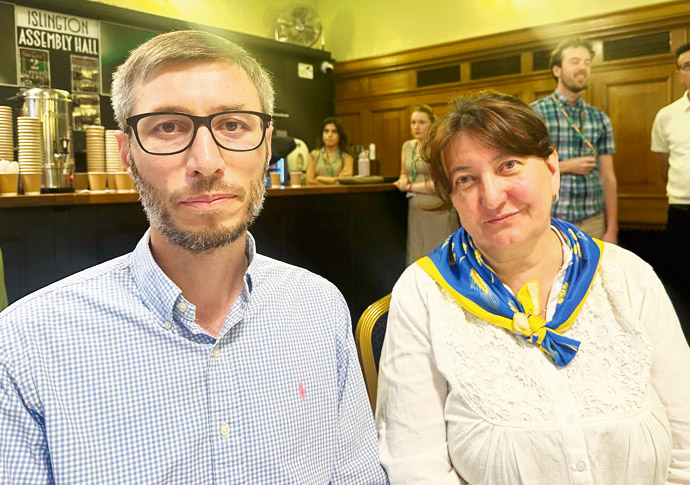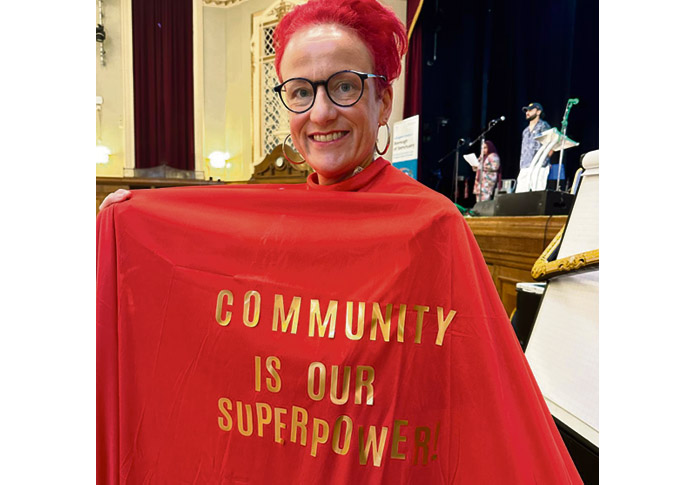‘You just need a small chance to prove yourself’
In Refugee Week, Syrian man tells how he rebuilt his life in Islington after fleeing war in Aleppo
Friday, 20th June — By Isabel Loubser

Ismail Azizi recalled his life as war broke out when he was just a teenager
A SYRIAN refugee has told how he has rebuilt his life in Islington after fleeing persecution in the Middle East.
Ismail Azizi, speaking to the Tribune at the beginning of Refugee Week, said he felt he was now living “a dream”.
The 31-year-old grew up in Aleppo, and recalled his life as war broke out when he was a teenager.
He said: “In the first year, I didn’t feel anything, but life became harder and harder. You want to go into the street, but you can’t, you want to see your friends, but you can’t. After two years of the war, you can’t eat. All the roads were closed to Aleppo, the government can’t bring food, the army is everywhere.”
Several years into the fighting, Mr Azizi suffered a head injury after being hit by shrapnel from a rocket exploding in the road behind a taxi he was in. “I spent two weeks in the hospital, they took out the shrapnel, and I survived. I am very lucky,” he said.
Five years ago Mr Azizi fled Syria, not wanting to be conscripted. He told the Tribune: “I didn’t want to die. I went to university for six years. I’m an architect. I didn’t want to go to the military and die.”
He arrived in Iraq by plane and worked there as a graphic designer. But in Iraq Mr Azizi faced persecution for his beliefs by the authoritarian regime and the UN brought him to the UK for his own protection.
In the six months Mr Azizi has spent in Islington he has found a job and lives near Essex Road with a friend who he met in Iraq.
Aided by a council scheme called Islington Working, Mr Azizi was given the chance to work as a graphic designer for a company in Angel called I Wish Design.
He said: “My manager is the kindest person I have ever met. It was not necessary to help me, and yet he helped me. He decided to give me a chance to show my skills and learn more, and I really appreciate what he did for me.”
Mr Azizi added: “Sometimes when you come to a new country, no one can know what you have and what you can do. You just need a small chance to prove yourself.”
He said of his new home in London: “There’s not a lot of bad people, you walk around and you feel like everyone is smiling for you. My neighbours are very kind people. Everyone I have met at the council has been very nice to me. They’ve helped me with my CV, with clothes for an interview, where can you find people who will help you in this way.”
But despite his new life, Mr Azizi said he still fears for his family who remain in Syria.
He added: “I worry about them because they don’t have money, and under the new Islamic government everything is changing. My father is old so he can’t work. It’s hard to live in two different countries. Here, you can work, you can eat. There, they can’t do anything.”
Boost for refugee and asylum aid

Sayed Habibulla Musawi and Taina Zavora
MORE than half-a-million pounds has been allocated to projects supporting refugees and asylum seekers in Islington, it was announced this week, writes Isabel Loubser.
The Borough of Sanctuary grants were awarded to 20 different organisations, which offer everything from barista training to therapy for survivors of torture.
The recipients were selected by a panel of 18 people who had themselves arrived in the borough as refugees – some in the past year, and others more than two decades ago.
Taina Zavora, who sat on the panel, fled Ukraine when the war broke out.
She said: “It was a very difficult time because I had left my job, my house, my husband, my friends. Like many refugees, I faced a language barrier, and it was a challenge adapting.”

Cllr Sheila Chapman said ‘migration and offering sanctuary is part of our DNA’ in Islington
Sayed Habibulla Musawi, who came in London almost exactly a year ago from Afghanistan, told the Tribune: “For the first few months, it was difficult for my family, because in Afghanistan we had lots of relatives and friends, and connection to each other. When we arrived here, that connection is completely lost.”
He added: “Most of the time, when we came to the UK, we all faced similar problems – like not knowing the language, struggling with isolation or mental health. We wanted to remove those problems for other people coming to the UK. We wanted to make sure that those problems would not exist again.”
The panellists were given training about the grant-making process, how to set criteria, and participated in sessions about unconscious bias and communication skills before making their selections.
At a ceremony in the Islington Assembly Hall on Wednesday, Cllr Sheila Chapman, the Town Hall’s equalities chief, said: “We’re not a council that wants to do things to people, we want to do it with them. I think that using the experience like that of people who have come here as refugees, as migrants, they know the process of seeking asylum, we’re going to get better outcomes, we’re going to fund projects that are actually going to make a difference.”
She added: “I’m really thrilled we’ve come together today here in Islington because migration and offering sanctuary is part of our DNA.”